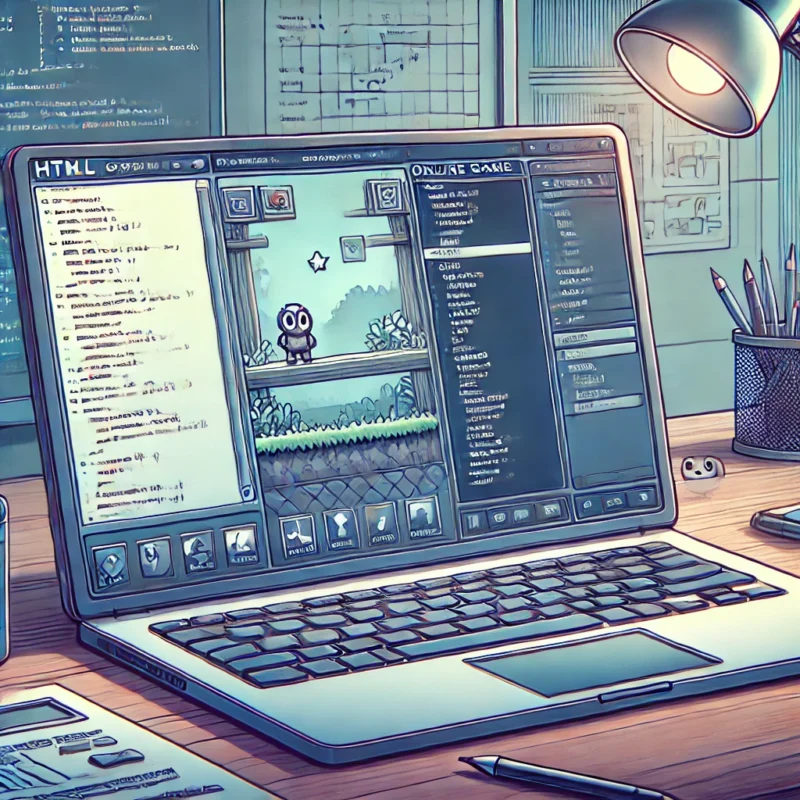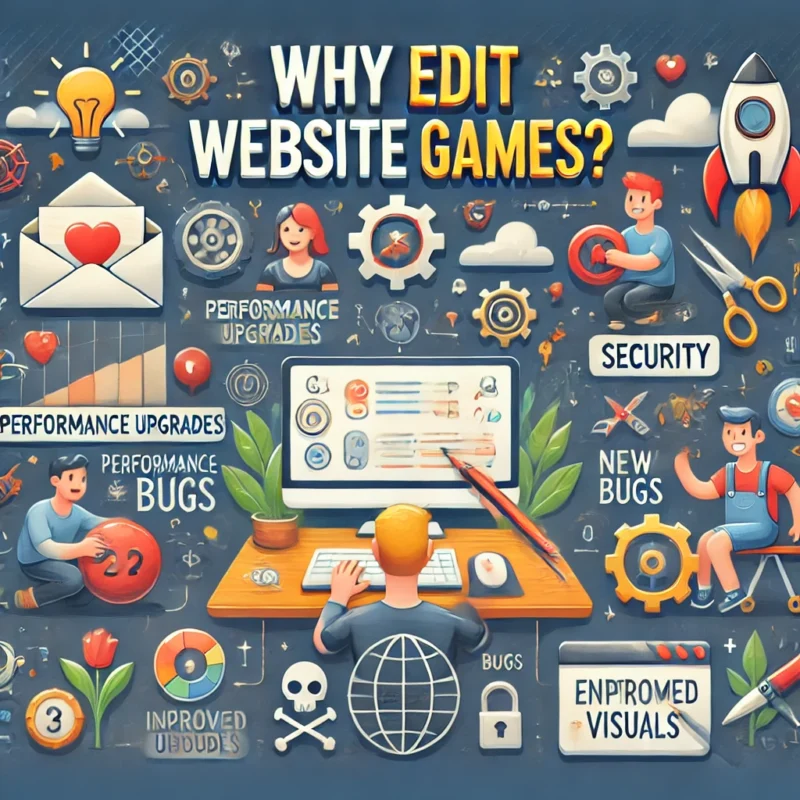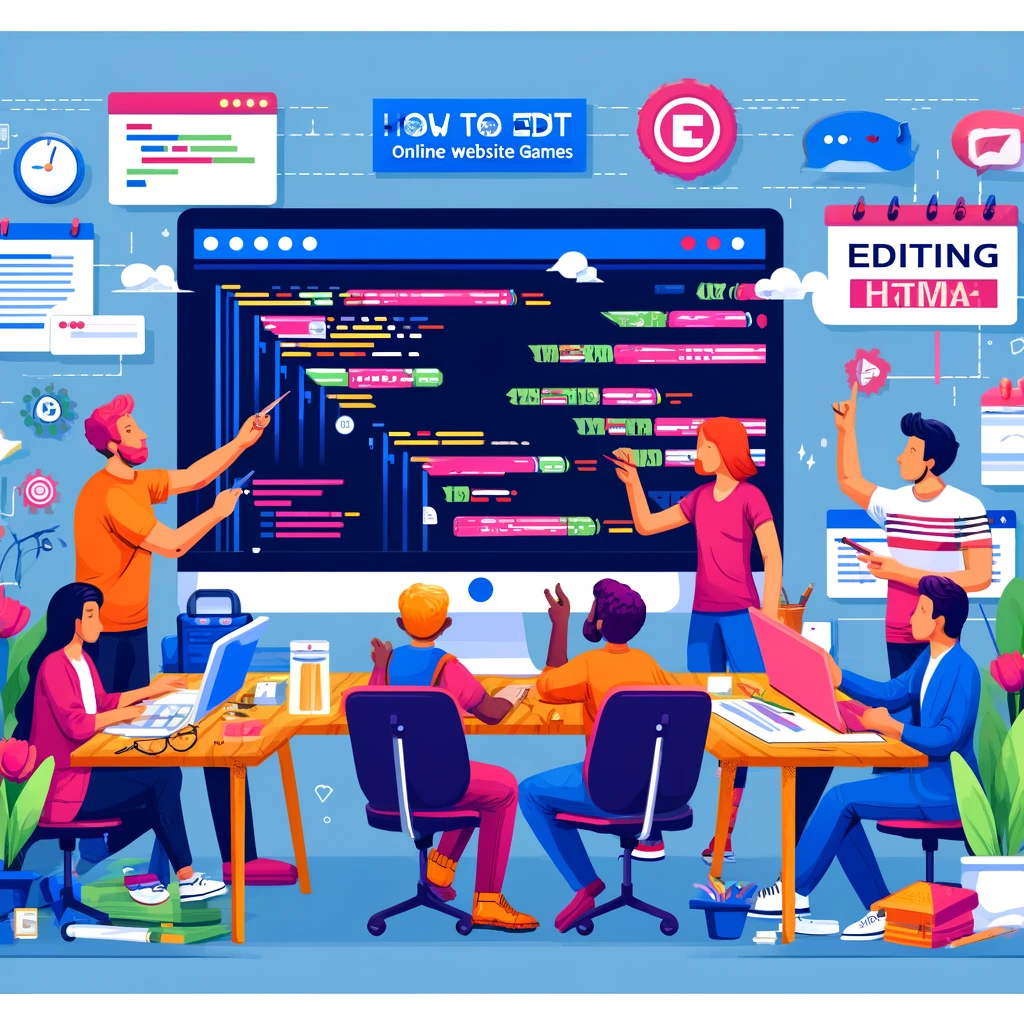Introduction
Online website games are action, fun, and entertaining, but sometimes you might want to change them up a bit. Editing these games can make them more enjoyable or challenging. This guide will show you different ways to edit online website games, from simple tweaks to more complex changes. We’ll look at tools, methods, and safety tips to help you modify games without causing problems.
The ability to edit games on websites is becoming more relevant. Whether you’re a developer, a gamer, or someone who manages an online platform, editing website games can enhance user experience and functionality. This guide will take you through the steps of how to edit online website games effectively, offering tips, examples, and easy-to-follow techniques.
Learn Steps By Steps Work Online Website Games
Online website games are programs that run in your web browser. They use different coding languages like JavaScript, HTML, and CSS. To edit these games, you’ll need to know a little about how they work.
What Does It Mean to Edit Online Website Games?

Before we dive into the specifics, it’s essential to understand what editing online website games actually means. This could involve changing game assets, modifying user interfaces, updating coding frameworks, or adding new features to existing games.
- Types of Edits:
- Design Edits: Altering the look and feel of a game.
- Feature Updates: Adding new levels, characters, or functionalities.
- Bug Fixes: Removing glitches or enhancing performance.
Why Edit Online Website Games?

Online games are constantly evolving, and editing is necessary to keep up with players’ expectations. Updating games also ensures they work correctly across various devices and browsers.
Reasons for Editing Website Games:
- User Experience Improvement: Making games more intuitive and enjoyable.
- Performance Optimization: Enhancing the speed and functionality of a game.
- Security Updates: Ensuring the game is protected against potential threats.
- Customization for Different Audiences: Tailoring a game’s design and features to better suit the player base.
Steps to Edit an Online Website Game

To edit a game successfully, follow these step-by-step instructions.
Step 1: Analyze the Game’s Current State
Before making any changes, it’s crucial to analyze the game as it is. Check for any bugs, outdated features, or poor design elements. Create a list of items that need to be updated or improved.
Step 2: Choose the Right Tools
Based on the game’s platform (HTML5, Flash, etc.), select the appropriate tool for editing. If you’re working with a game developed using Unity, for instance, Unity is your best bet for editing it.
Step 3: Access the Game Files
To make changes to the game, you’ll need access to the source code or game files. This is typically done through the web server that hosts the game. If the game files are stored in the cloud, ensure you have the right permissions to edit them.
Step 4: Edit the Game’s Code or Assets
Now, you can start making changes to the game. Depending on what you’re editing (design, functionality, or features), this could involve:
- Changing the game’s source code to fix bugs or add new functionality.
- Replacing or updating visual elements, such as characters, backgrounds, and UI components.
- Tweaking the game’s performance settings to improve speed and loading times.
Example of Game Editing:
Let’s say you want to edit a simple 2D platformer game. Here’s how you might go about it:
- Change Character Design: If you want to modify the character’s appearance, you can replace the existing character sprite with a new one.
- Add a New Level: To add a new level, you’ll need to edit the game’s level design files and code to include it in the game’s flow.
- Fix Bugs: If players are reporting issues with collision detection in the game, you can edit the physics settings in the game’s code.
Tips for Editing Online Website Games

Editing online games can be complex, but following these tips will make the process smoother.
- Backup Your Game Files: Always back up your game before making any changes. This way, if something goes wrong, you can restore the original version.
- Test Regularly: After making each edit, test the game to ensure everything works as expected. This will help you catch bugs early.
- Use Version Control: Tools like Git can help you keep track of changes and revert to earlier versions if needed.
- Collaborate with Developers: If you’re unfamiliar with coding, it’s a good idea to work closely with a developer who can assist with more complex edits.
Common Issues When Editing Online Games
When editing online games, you may run into some common challenges. Here are a few to watch out for:
- Browser Compatibility: Ensure the game works with different browsers (Chrome, Firefox, Safari, etc.).
- Loading Times: After editing, your game might load slower if it is not optimized. Monitor performance metrics.
- Coding Errors: Mistakes in the code can cause the game to crash or behave unexpectedly. Testing after each change helps catch these errors.
Optimizing Your Game for Different Devices
With players accessing online games from various devices, it’s important to optimize the game for both mobile and desktop. Here’s how you can ensure the best performance:
- Responsive Design: Make sure the game’s UI adjusts to different screen sizes.
- Touch Controls: If your game is playable on mobile devices, implement touch-friendly controls.
- Performance Scaling: Offer players the ability to lower graphics settings on less powerful devices for better performance.
Adding New Features to Your Game
Adding features can make the game more engaging. Here are a few ideas for new features:
- Multiplayer Mode: Allow players to interact with each other in real-time.
- Leaderboard: Create a leaderboard to showcase top scores.
- Achievement System: Add badges or rewards for completing certain tasks or reaching milestones.
User Feedback and Game Updates
Gathering feedback from users is crucial in knowing what works and what doesn’t. Regular updates based on user feedback can keep your game relevant and exciting.
- How to Gather Feedback:
- Surveys or polls.
- Social media discussions.
- In-game feedback forms.
Tools and Platforms for Editing Online Website Games HTML

There are several tools available that make editing online games straightforward, even for those with minimal coding experience. Here are some popular ones:
- Unity: A powerful tool often used for developing and editing games, especially those that run on websites. It offers a vast library of assets and plugins.
- GameMaker Studio: Ideal for 2D games, GameMaker Studio provides an intuitive interface for editing game elements without needing to code extensively.
- Construct 3: A browser-based game development platform that is perfect for editing HTML5 games.
Parts of an online game:
- HTML: The game’s structure
- CSS: How the game looks
- JavaScript: How the game works and responds to player actions
Common file types in online games:
- .js (JavaScript files)
- .html (HTML files)
- .css (CSS files)
- .png, .jpg, .gif (Image files)
Game elements you can edit:
- Player characters
- Enemies
- Levels
- Scores
- Game speed
- Visual effects
Before you start editing, it’s important to know that some changes might make the game stop working. Always keep a backup of the original files so you can undo your changes if needed.
Basic Tools for Editing Online Games
To edit online games, you’ll need some tools. Here are some basic ones that are easy to use:
- Web browser developer tools Most web browsers have built-in tools for viewing and changing web page code. Here’s how to open them in different browsers:
BrowserHow to open developer toolsChromePress F12 or Ctrl+Shift+IFirefoxPress F12 or Ctrl+Shift+ISafariPress Cmd+Option+IEdgePress F12 or Ctrl+Shift+I
- Text editors Text editors help you change game files directly. Some good options for beginners are:
- Notepad++ (Windows)
- TextEdit (Mac)
- Sublime Text (Windows, Mac, Linux)
- Visual Studio Code (Windows, Mac, Linux)
- Browser extensions Some extensions can help you edit games more easily:
Extension nameWhat it doesTampermonkeyLets you run custom scripts on websitesGreasemonkeySimilar to Tampermonkey, for FirefoxStylebotHelps you change how games look with CSS
- Image editors For changing game graphics, try these:
- GIMP (free, works on all computers)
- Paint.NET (free, for Windows)
- Pixlr (online editor, works in your browser)
When using these tools, start with small changes to see how they affect the game. This way, you can learn without breaking things too much.
Simple Game Edits Anyone Can Do
Let’s start with some easy edits that don’t need much coding knowledge:
- Changing colors You can change how a game looks by editing its CSS. Here’s an example:
Original CSS:
cssCopy.player {
background-color: blue;
}Changed CSS:
cssCopy.player {
background-color: red;
}This would change the player’s color from blue to red.
- Adjusting game speed Many games use JavaScript to control speed. Look for variables like these:
javascriptCopylet gameSpeed = 1;
let playerSpeed = 5;Try changing the numbers to make the game faster or slower.
- Changing text You can edit the game’s HTML to change what it says. For example:
Original HTML:
htmlCopy<div id="score">Score: 0</div>Changed HTML:
htmlCopy<div id="score">Points: 0</div>This would change “Score” to “Points” in the game.
- Swapping images Find image files in the game’s code and replace them with your own. Make sure the new image is the same size and file type as the original.
Original code:
htmlCopy<img src="player.png" alt="Player">Changed code:
htmlCopy<img src="my-new-player.png" alt="Player">Remember to upload your new image file to the right place for this to work.
- Changing game difficulty Look for variables that control how hard the game is:
javascriptCopylet enemyCount = 5;
let obstacleSpeed = 3;Increasing these numbers usually makes the game harder.
Try these simple edits first to get comfortable with changing games. Always refresh the page to see your changes take effect.
Intermediate Editing Techniques
Once you’re comfortable with basic edits, you can try more complex changes:
- Adding new features You can add new buttons or power-ups to games. Here’s an example of adding a speed boost button:
HTML to add:
htmlCopy<button id="speedBoost">Speed Boost</button>JavaScript to make it work:
javascriptCopydocument.getElementById('speedBoost').addEventListener('click', function() {
playerSpeed *= 2;
setTimeout(function() {
playerSpeed /= 2;
}, 5000);
});This code doubles the player’s speed for 5 seconds when the button is clicked.
- Changing game rules You can edit how the game works by changing its JavaScript. For example, to make a game give double points:
Original code:
javascriptCopyfunction addScore(points) {
score += points;
}Changed code:
javascriptCopyfunction addScore(points) {
score += points * 2;
}- Creating new levels Many games store level data in arrays or objects. You can add your own levels by copying and changing these. Here’s a simple example:
Original levels:
javascriptCopylet levels = [
{
enemies: 5,
powerups: 2
},
{
enemies: 10,
powerups: 1
}
];Adding a new level:
javascriptCopylet levels = [
{
enemies: 5,
powerups: 2
},
{
enemies: 10,
powerups: 1
},
{
enemies: 15,
powerups: 3
}
];- Changing game physics If a game uses physics, you can change how things move. Look for code like this:
javascriptCopylet gravity = 0.5;
let jumpForce = 10;Changing these numbers will affect how the game feels to play.
- Adding cheat codes You can make secret codes that give players special powers. Here’s a simple way to do it:
javascriptCopydocument.addEventListener('keydown', function(event) {
if (event.key === 'c') {
playerLives = 99;
console.log('Cheat activated: 99 lives!');
}
});This gives the player 99 lives when they press the ‘c’ key.
When making these changes, test your game often to ensure it still works. If something breaks, you can always restore your backup files.
Advanced Game Editing Methods
For those who want to make bigger changes, here are some advanced techniques:
- Injecting custom scripts You can use browser extensions like Tampermonkey to add your own code to games. Here’s how:
- Install Tampermonkey in your browser
- Click the Tampermonkey icon and choose “Create a new script”
- Add your code, starting with this:
javascriptCopy// ==UserScript==
// @name My Game Mod
// @match https://www.example.com/game
// @grant none
// ==/UserScript==
(function() {
'use strict';
// Your code here
})();Replace “https://www.example.com/game” with the actual game URL.
- Modifying game assets You can change game files directly if you can download them. Here’s the process:
- Use browser dev tools to find and save game files
- Edit the files with appropriate software (e.g., text editor for code, image editor for graphics)
- Use a local web server to test your changes
- If everything works, upload the modified files back to the game’s server (if you have permission)
- Reverse engineering game logic For complex changes, you might need to figure out how the game works internally:
- Use the browser’s debugger to set breakpoints in the game code
- Step through the code as the game runs to see how it works
- Take notes on important functions and variables
- Use this information to make more precise changes
- Creating game mods Some online games support mods (modifications). If a game allows mods, you can create new content:
- Study the game’s modding documentation
- Create new assets (levels, characters, items) following the game’s format
- Write scripts to integrate your new content
- Package your mod according to the game’s guidelines
- Share your mod with other players (if allowed)
- Using APIs and external data Some games let you connect to outside data sources. Here’s a basic example using a weather API:
javascriptCopyfetch('https://api.weatherapi.com/v1/current.json?key=YOUR_API_KEY&q=London')
.then(response => response.json())
.then(data => {
let temperature = data.current.temp_c;
// Use the temperature to change the game environment
if (temperature > 30) {
setGameBackground('desert');
} else if (temperature < 0) {
setGameBackground('snow');
}
});This would change the game’s background based on real-world weather in London.
Remember, advanced edits can have big effects on games. Always test thoroughly and respect the game creators’ rules about modding.
Safety and Ethics in Game Editing
When editing online games, it’s important to be safe and respectful. Here are some things to keep in mind:
- Legal considerations
- Check the game’s terms of service before editing
- Don’t distribute copyrighted material without permission
- Be careful with mods that could give unfair advantages in multiplayer games
- Security risks
- Don’t run scripts or code you don’t understand
- Be careful when downloading files or tools from unknown sources
- Keep your antivirus software up to date
- Fair play
- In multiplayer games, don’t use edits to cheat or harm other players’ experiences
- If you make a mod, clearly label what it changes about the game
- Backing up your work
- Always save original game files before editing
- Keep multiple versions of your edits in case you need to go back
- Sharing your edits
- If you share your mods, include clear instructions on how to use them
- Be open to feedback and be ready to fix any problems your edits might cause
- Respecting game creators
- Give credit to the original game creators when sharing your edits
- Don’t try to pass off the entire game as your own work
- Staying updated
- Game updates might break your edits, so be prepared to update your mods
- Follow gaming news to stay informed about changes in modding policies
By following these guidelines, you can edit games in a way that’s fun, safe, and respectful to others.
Troubleshooting Common Issues
When editing games, you might run into problems. Here are some common issues and how to fix them:
- Game won’t load after changes
- Check for typos in your code
- Make sure all file paths are correct
- Verify that you didn’t accidentally delete important code
- New features don’t work
- Check the browser console for error messages
- Make sure your new code is in the right place in the game files
- Test each part of your new feature separately to find the problem
- Game performance issues
- Look for loops or functions that might be running too often
- Be careful with how many new elements you add to the game
- Test on different devices to see if the problem is widespread
- Graphics glitches
- Ensure new images are the correct size and format
- Check that CSS changes don’t conflict with existing styles
- Verify that you’re not accidentally hiding important game elements
- Sound problems
- Make sure audio file paths are correct
- Check that the audio format is supported by the browser
- Look for JavaScript errors that might be stopping sound playback
- Multiplayer sync issues
- Be very careful when editing multiplayer game code
- Test thoroughly with multiple players before sharing changes
- Consider how your edits might affect game balance
- Browser compatibility
- Test your edits in different browsers
- Use standardized code that works across multiple browsers
- Be aware that some advanced features might not work in older browsers
If you can’t solve a problem, try these steps:
- Undo your latest changes to see if that fixes the issue
- Look for similar problems and solutions in coding forums
- Ask for help in game modding communities, showing your code and describing the problem clearly
Learning from Your Edits
Editing games is a great way to learn about programming and game design. Here are some tips to get the most out of your editing experience:
- Keep a record of your changes
- Write down what you change and why
- Note any problems you encounter and how you solve them
- This record will help you learn and can be useful for future projects
- Experiment with different types of edits
- Try changing graphics one day, game logic another
- See how small changes can have big effects on gameplay
- Learn from the original code
- Study how the game developers structured their code
- Try to understand why they made certain choices in their design
- Share your work and get feedback
- Show your edits to friends or online communities
- Be open to suggestions and critiques
- Challenge yourself
- Start with small edits and gradually try more complex changes
- Set goals for yourself, like adding a completely new feature to a game
- Apply what you learn to other areas
- The skills you gain from editing games can be useful in web development, app creation, and other programming fields
- Stay curious
- Game technology is always changing, so keep learning about new tools and techniques
- Follow game development blogs and forums to stay up to date
By treating each edit as a learning opportunity, you’ll improve your skills and understanding of how games work.
Conclusion
Editing online website games can be a fun and rewarding hobby. It lets you customize your gaming experience and learn valuable skills. Remember to start small, be patient, and always keep safety and ethics in mind. As you get better at editing, you might even find yourself interested in making your own games from scratch.


